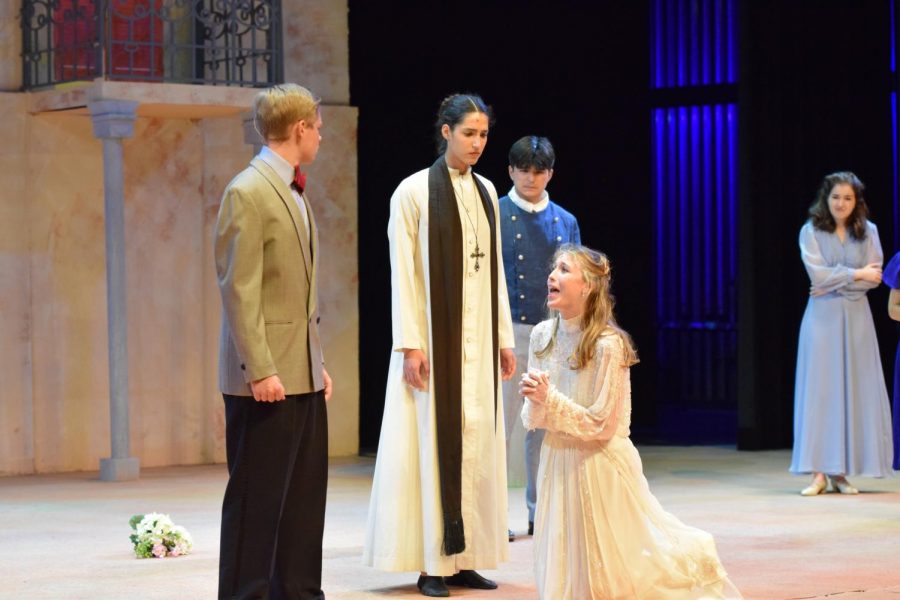The life of a St. John’s performer
For actors, theater is worth sacrificing school and free time. Many view theater as a recreational pastime rather than a burden.
March 10, 2022
As senior Alex Flores walked onto center stage for the last time in the fall play “Much Ado About Nothing,” he felt a triumphant euphoria as the audience erupted into applause. Yet, through this happiness, a slight sadness touched Flores.
“It was a bittersweet moment,” Flores said. “There was this sense of, ‘Wow, I have so much free time now,’ but I was also sad that it was over.”
Preparations for both the play and the musical “Newsies” began months before their opening nights, starting with auditions.
“During auditions, people sang some of the songs, performed a monologue and did some dances,” said sophomore Arjun Singhal, who performed in the special ensemble for “Newsies.” “It gave the directors a sense of what they had and what they could work with.”
The immediate months after auditions were quiet. During this lull period, actors attended six-hour-long weekend workshops and worked one-on-one with directors to perfect their scenes.
“I spent maybe 10 minutes before musical rehearsals memorizing lines,” senior Leah Beach said. “Theater takes up more time once tech week approaches, but until then everyone is waiting to sew the show together.”
In addition to individual scene work, small groups of actors were called in throughout the week to rehearse scenes, while other students created the sets for productions.
“Each individual rehearsal was like a puzzle piece,” Singhal said. “We were slowly putting all the pieces together until we had a complete puzzle.”
Over the next few months, actors transitioned from script reading to onstage performing and blocking. Relying less on the script allowed them to enhance their lines through dialect, gestures and stage movements.
“That next month or two before the final week, we faded our movement and words into one,” Flores said.
As productions entered their final month of preparation, actors devoted the bulk of their time to theater. Weekly rehearsals became daily events that lasted up to six hours.
“I was at school for six to seven hours a day, every day of the week,” Flores said. “It was definitely stressful, and it almost felt a bit like a time bomb.”
During tech week, the pieces of the productions were finally put together, and rehearsals moved from the Fine Arts Annex to Lowe Theater. For the first time, actors practiced with costumes, lighting, sound effects and props, and directors made their final suggestions before the performance premiered.
“Tech week is really what it’s all about; it’s crunch time,” Singhal said. “We had rehearsals every day from four to ten after school until we hit the show, so I basically lived at school during those weeks.”
Before opening night, many actors, including Flores and Singhal, worried about letting down fellow castmates who devoted countless hours to their craft. But this anxiety dissipated once Flores and Singhal were on stage and in character.
“Once I was in character, I kind of forgot about all the stress,” Flores said. “Even if I messed up, it wasn’t too hard to get back into a rhythm.”
The end of production was met with a mixed reaction from Flores and Singhal who are inundated with exhilaration, but also overwhelmed with a feeling of emptiness.
“It really started to sink in that I’ve spent a whole year rehearsing this musical,” Singhal said. “The worst part is that I grew close to some of the seniors, and then I realized that I was never going to get to do a show with them at St. John’s again.”
For actors, theater is worth sacrificing school and free time. Many view theater as a recreational pastime rather than a burden.
“The show has been such an exciting time of my life,” Singhal said. “I both mentally and physically lived at school during the musical, but I was also having such a good time, and to be honest, the musical is kind of a home away from home.”





